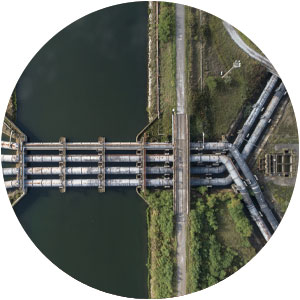Risky Business
Water resources answer to the laws of nature, not to human beings. Any business missing this, risks paying a hefty price.

The cost of water to a business may seem relatively small compared to energy costs, particularly given recent hikes …


 Nutrient neutrality rules that protect water quality are under threat in England. The government argues that 100,000 additional homes will be built in the next decade as a result.
Nutrient neutrality rules that protect water quality are under threat in England. The government argues that 100,000 additional homes will be built in the next decade as a result. WHS can ensure that piled foundations and penetrating ground improvements present no risk to controlled waters.
WHS can ensure that piled foundations and penetrating ground improvements present no risk to controlled waters. Economic pressures, social divides, and pressing environmental problems fuel angst in today’s world. The pessimism of ‘eco-anxiety’ is driven by fear for the environment’s future, and flood risks feature large. We must shape something different.
Economic pressures, social divides, and pressing environmental problems fuel angst in today’s world. The pessimism of ‘eco-anxiety’ is driven by fear for the environment’s future, and flood risks feature large. We must shape something different. Replacing an established plan is never straightforward. Accepted norms are challenged and disruption usually follows. This has certainly been the case for the Welsh Government as they have sought to update their TAN15 planning guidance.
Replacing an established plan is never straightforward. Accepted norms are challenged and disruption usually follows. This has certainly been the case for the Welsh Government as they have sought to update their TAN15 planning guidance. Almost 13 years to the day after gaining royal assent, Schedule 3 of The Flood and Water Management Act is scheduled for implementation, offering a clearer way forward for sustainable drainage measures in England.
Almost 13 years to the day after gaining royal assent, Schedule 3 of The Flood and Water Management Act is scheduled for implementation, offering a clearer way forward for sustainable drainage measures in England. Hurricanes, aka tropical cyclones, are one of the most extraordinary and potent forces seen in nature. One of the world’s most at-risk areas is the east coast of America, but what lessons are there for the UK?
Hurricanes, aka tropical cyclones, are one of the most extraordinary and potent forces seen in nature. One of the world’s most at-risk areas is the east coast of America, but what lessons are there for the UK? The UK has long been defined by its relationship with water, but this is changing. In every region watercourses face multiple stresses. In England only 14% of rivers are classified as having good ecological status. Our waterways are our national …
The UK has long been defined by its relationship with water, but this is changing. In every region watercourses face multiple stresses. In England only 14% of rivers are classified as having good ecological status. Our waterways are our national …